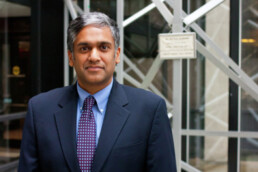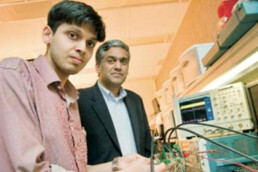In Your Community: Meet Anantha Chandrakasan
From Berkeley researcher to EECS department head
They told him that it wouldn’t work. “When we went to conferences, they did not believe that complex digital circuits could reliably operate at low voltages.”
Then a graduate student at the University of California, Berkeley, Professor Anantha P. Chandrakasan wasn’t entirely sure it would work either.
In the end, though, his low-power chip designs did work, and one year later, Chandrakasan gave one of the most influential talks in the history of the International Solid-State Circuits Conference. So many people attended that some couldn’t even get close enough to hear, so the organizers asked him to give the talk a second time — a first for the conference.
Batteryless energy harvester
Running electronics on body heat
MIT researchers have demonstrated a wearable power generator that uses the difference in temperature between your skin and the surrounding air – even just a couple of degrees – to produce a small, steady flow of power to run your medical monitor or your Bluetooth® headset. No need for a battery.
In the wearable power generator, a commercially available “thermal harvester” turns the temperature difference into electricity, but the generated voltage and current are tiny. The MIT solution: a novel “interface circuit” that boosts that tiny voltage to a useful level, keeps it constant despite temperature changes, and delivers the highest-ever fraction of the power from the harvester to the device.

